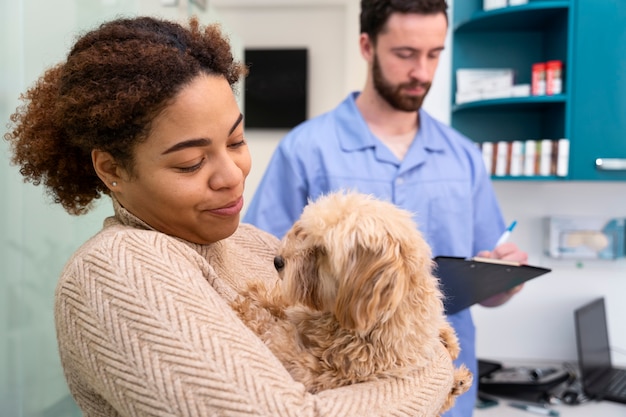What to Expect From Pet Cancer Surgery at Rapides


What to Expect From Pet Cancer Surgery at Rapides
When you hear that your pet may need cancer surgery, it can feel overwhelming and frightening. At Rapides Animal Medical Center, located at 5990 Jackson Street, Alexandria, LA 71303, we understand the deep bond you share with your pet and the anxiety that comes with a serious diagnosis. Our veterinary team is committed to guiding you through every step, from the initial consultation to the recovery process, and providing advanced pet surgical options in Alexandria, LA. In this comprehensive guide, you will discover how our approach to pet cancer surgery supports families in Alexandria and surrounding communities, what to expect before and after surgery, and how our compassionate care can help your pet return to a happy, comfortable life.
If you are searching for a "vet near me" who offers both expertise and understanding, Rapides Animal Medical Center is here to serve as your trusted partner. We will explore the signs that may indicate your pet needs cancer surgery, what causes cancer in pets, the available veterinary surgical options in Alexandria, LA, and how you can play a proactive role in your pet’s care. For those wanting to learn more about our approach, you can also find detailed information about cancer surgery for pets on our website. Throughout this blog, you will gain valuable insights and actionable advice to help you make informed decisions about your pet’s health.
Recognizing the Signs: When Might Your Pet Need Cancer Surgery?
Early detection plays a crucial role in the success of pet cancer surgery. Understanding the warning signs can help you seek veterinary attention before a condition progresses. Symptoms that may indicate a need for cancer surgery in pets include the appearance of new lumps or masses on your pet’s body, especially if they are rapidly growing or changing in texture. Other warning signs are unexplained weight loss, persistent sores that do not heal, changes in appetite or drinking habits, and difficulty breathing or swallowing.
Additionally, pets may show signs such as limping without an obvious injury, lethargy that persists for several days, or abnormal bleeding. Sometimes, a pet will seem less interested in playing or going for walks, or you may notice swelling in a specific area. These symptoms are not always specific to cancer but should never be ignored, as early intervention can make a significant difference. If your pet is displaying any of these changes, our veterinary professionals encourage you to schedule an appointment so that we can perform a thorough evaluation, which may include diagnostic testing and ultrasounds. For more details about our diagnostic capabilities, you can visit our page on pet diagnostic lab services.
Understanding the Causes: Why Does Cancer Develop in Pets?
Cancer in pets is a complex disease, much like it is in humans, and can affect cats and dogs of any age or breed. The underlying causes of cancer in pets often include a combination of genetic predisposition, environmental factors, and age-related changes. Certain breeds may have a higher risk of specific types of tumors, and older pets are generally more susceptible, as their cells have undergone more divisions over time.
Environmental factors can play a role as well, such as exposure to secondhand smoke, chemicals, or prolonged sunlight. Poor diet, obesity, and lack of exercise may also contribute to a weakened immune system, increasing the risk of cancer development in some pets. In Louisiana, where pets spend significant time outdoors, vigilance for skin changes or lumps is particularly important due to the warm climate and increased exposure to the sun. While it is not always possible to pinpoint the exact cause of cancer in an individual pet, knowing the risk factors can help you be proactive about routine veterinary care and screenings, especially if you are searching for pet surgical options in Alexandria, LA.
Pet Cancer Surgery: What to Expect From Treatment Options
When your pet is diagnosed with cancer, our veterinary team will work closely with you to develop a personalized treatment plan. Pet cancer surgery in Alexandria, LA, is often the primary approach for removing tumors that are localized and have not spread to other areas. The goal is to excise the tumor with a margin of healthy tissue, reducing the risk of recurrence and helping to restore your pet’s quality of life.
The Surgical Process and Preparation
Your pet’s cancer surgery begins with a comprehensive consultation and diagnostic workup, which may involve laboratory tests, digital radiographs, and ultrasounds to assess the extent of the disease. Our veterinarians will explain the surgical procedure in detail, discuss anesthesia protocols, and answer any questions you may have. We understand that this is a stressful time for families, and we prioritize communication, comfort, and safety throughout the process.
On the day of surgery, your pet will be closely monitored by our veterinary professionals using advanced equipment. After surgery, your pet will recover in a quiet, temperature-controlled environment with one-on-one attention. Pain management is always a top priority, and our team will tailor medications to your pet’s specific needs. You will receive thorough instructions for at-home care, including how to monitor the incision site, manage medications, and encourage gentle activity.
For certain internal tumors or more complex cases, your veterinarian may recommend other surgical options that can be discussed in detail during your appointment. You can find more about internal surgery services offered at Rapides Animal Medical Center, which address a variety of serious internal conditions in pets. Our advanced imaging, such as veterinary ultrasounds, helps ensure we have the most accurate information before proceeding with surgery.
Aftercare and Recovery
Postoperative care is essential for a successful recovery following pet cancer surgery in Alexandria, LA. Most pets will need to rest quietly at home, wear a protective collar to prevent licking at the incision, and return for follow-up visits so our team can monitor healing. Some pets may require additional treatments such as chemotherapy or radiation, depending on the type and grade of cancer. Our veterinary team will discuss all options and support you in making the best decision for your pet’s unique situation.
At-Home Care and Prevention: What Can Pet Owners Do?
While not all cancer can be prevented, you can take important steps to support your pet’s overall health and reduce risk factors. Regular wellness examinations, maintaining a healthy weight, and feeding a balanced diet are foundational. Annual or semi-annual checkups allow our veterinarians to detect subtle changes that may indicate a developing problem, especially for senior pets or breeds with known cancer risks.
Monitoring your pet for new lumps, changes in behavior, or signs of illness and bringing these to your veterinarian’s attention promptly is another proactive measure. Limiting exposure to harmful substances such as tobacco smoke and toxic chemicals, as well as providing shade for pets that spend time outdoors, are additional ways to minimize environmental risks. For those seeking preventive advice or routine screenings, searching for "veterinary services near me" can help you connect with trusted professionals like our team at Rapides Animal Medical Center.
When to Seek Veterinary Care: Acting Quickly Makes a Difference
Timely veterinary care is vital when dealing with potential cancer in pets. If you notice any of the warning signs discussed earlier—such as a rapidly growing lump, unexplained weight loss, persistent sores, or significant changes in your pet’s behavior—it is important to schedule an appointment with your veterinarian as soon as possible. Early intervention can improve the prognosis and expand the available pet surgical options in Alexandria, LA.
Our veterinary team at Rapides Animal Medical Center is equipped to provide diagnostic evaluations, advanced imaging, and expert guidance on the best course of action. If your pet experiences sudden difficulty breathing, severe bleeding, or collapses, seek emergency veterinary care immediately, as these symptoms can indicate a life-threatening situation. For non-urgent concerns or routine screenings, our team is here to support you with compassion and expertise throughout every stage of your pet’s health journey.
Supporting Your Pet’s Health: Next Steps and Contact Information
Facing a cancer diagnosis in your pet is never easy, but you do not have to navigate this journey alone. At Rapides Animal Medical Center, our experienced veterinarians in Alexandria are dedicated to providing advanced pet cancer surgery, comprehensive aftercare, and ongoing support for families just like yours. Whether you are searching for a "vet near me" who offers advanced surgical care or simply need guidance on the best pet surgical options in Alexandria, LA, our team is ready to help.
We encourage you to reach out to our veterinary professionals to schedule an appointment or discuss your concerns. You can contact us at (318) 445-5245 or visit us in person at 5990 Jackson Street, Alexandria, LA 71303. If you wish to learn more about our approach to cancer surgery for pets, our website provides additional resources and information. Your pet’s wellbeing is our highest priority, and we are committed to offering quality veterinary services near you in Alexandria and surrounding communities. Let us partner with you to provide the care and compassion your pet deserves every step of the way.
This blog is intended for informational purposes only and should not be used as a substitute for professional veterinary advice. If you have specific concerns about your pet’s health, please schedule an appointment with your veterinarian for a comprehensive evaluation.

















